My mother was brought up in a family ruled by a very orthodox old curmudgeon—sorry, gentleman—who believed cinema was inherently evil. This was my great-grandfather, and thanks to his restrictions, the only films my mother and her siblings were allowed to watch were The Ten Commandments and Quo Vadis. After his death, though, the family let themselves go to seed. No, they didn’t start watching all the porn they could lay their hands on (I doubt there was much floating around in the Calcutta of the 60’s, anyway), but they certainly began seeing some films that, while not evil by any stretch of imagination, would probably not have won great-granddad’s approval. The Innocents. The Three Faces of Eve. And this one, a thought-provoking, disturbing film that raises a lot of questions.
Judgement at Nuremberg is based on the real-life trials of various Nazis and members of Hitler’s administration, in 1948-49. The film begins in the city, large areas of which have been bombed, leaving mere shells of buildings. The people of Nuremberg are gathering up the pieces of their lives, and the occupying Americans have constituted a tribunal to try four judges accused of having sent thousands to their deaths during the years of the Third Reich.
The chief judge of the tribunal is the self-confessedly provincial Judge Dan Haywood (Spencer Tracy), white-haired and wise. His young aide, who’s been in Germany two years now, is the young Captain Harrison Byers (a dark-haired William Shatner in his pre-Star Trek days).
Aided by two other judges, Judge Norris (Kenneth MacKenna) and Judge Ives (Ray Teal), Judge Haywood begins the proceedings. In the dock are four men, all of them once prominent legal figures in the Nazi administration. There is Emil Hahn (Werner Klemperer), described by a witness as ‘brutal’ and still belligerent:
Friedrich Hofstetter (Martin Brandt), colourless, insipid and probably also a little nervous:
Werner Lampe (Torben Meyer), inclined to gulp and look scared:
…and Ernst Janning (Burt Lancaster), famous jurist, writer of several law books, and formerly in the Ministry of Justice. A strange man, taciturn and poker-faced, of whom they get to hear very contradictory things in the course of the proceedings.
The indictment is that these men, in the course of their years in the judge’s seat, passed sentence on thousands of people whose political convictions and/or race were not in line with what the Nazis dictated. The unfortunate people brought before Hahn, Hofstetter, Lampe and Janning found themselves condemned to death or concentration camps or sexual sterilisation, for no fault other than being Jewish, Communist, or otherwise ‘unacceptable’.
The trials begin, the four judges being represented by an earnest young lawyer, Hans Rolfe (Maximilian Schell, in an Oscar-winning role. Incidentally, he holds the record for being the person lowest down in the credits to ever win an award for a lead—his name appears fifth in the credits for the film). Rolfe feels that the dignity of Germany hinges on these four men being acquitted. The country has been devastated by the war, and the taint of the holocaust has branded everybody. To wash off that taint, to salvage some of their pride, the Germans need to learn from the past—and then leave it behind.
For the prosecution, the lawyer is Colonel Lawson (Richard Widmark), who’s been in Germany for a couple of years now, prosecuting others who committed war crimes. He makes no bones about his dislike for Rolfe, a feeling that’s mutual.
Slowly, several stories begin to unfold, each a damning testimony to the atrocities of the past. Names begin to emerge from the crowd of unnamed dead. In the courtroom arrive those who will relive the days when injustice was done in the name of the law. Sitting in the dock, an ex-judge who resigned when the Nazis came to power admits that Janning obeyed Nazi stipulations for all judges to wear swastikas on their robes. Others testify to Janning’s fine record as an upholder of justice.
Among the witnesses is the fidgety Rudolph Petersen (Montgomery Clift), a baker’s assistant who had, by order of a court, been forcibly sterilised. Why? Because he is—as it appears—a little weak in the head? Or because his father, a railroad worker, had been a member of the Communist Party?
And there’s Irene Hoffmann Wallner (Judy Garland), now married, but once the main witness in the infamous Feldenstein case, in which a wealthy Jew named Feldenstein was executed for the crime of ‘racial pollution’. Of having, in other words, ‘intimate relations with one of the Aryan race’—Irene Hoffmann, then 16 years old and a tenant staying in a block of flats owned by Feldenstein. Are Irene’s protestations, that Feldenstein was like a father to her, a mere attempt to keep her own name clear of a sordid tale? Is this a consummate actress, or was Feldenstein really innocent?
Over 8 months of sessions in court, from the arguments and counter-arguments that Rolfe and Lawson come up with, and from the horrifying visual evidence—films of concentration camps—emerge a series of questions. Where does an individual’s responsibility lie? What is the dividing line between patriotism and humanity? Can responsibility for a death in a concentration camp be ascribed to a judge who signed an order decreeing imprisonment? Shouldn’t that responsibility lie with whoever turned the lever switching on the gas? Or whoever ordered that gas to be turned on? And what was the rest of the world doing when Hitler came to power? In 1938, Churchill had praised Hitler for his dynamism; the Soviet Union had already signed a treaty with Hitler, and American industrialists were making large profits from deals with Hitler’s Germany for defence equipment. Were these—the Soviets, the Americans, the UK—completely innocent of any responsibility for what Hitler later did? Isn’t responsibility, as Haywood says, “not a cut and dried affair”?
Outside the court too, Dan Haywood is learning more about Germany, as it was and as it now is. The butler and housekeeper of the mansion where he’s been billeted are a Mr and Mrs Halbestadt (Ben Wright and Virginia Christine). The Halbestadts are, as Haywood sees for himself, ‘good people’. And yet, these good people, even though they lived only a few miles from a concentration camp, insist that they didn’t know about it. And if they did know, what could they have done?
The Halbestadts’ former mistress, the very elegant widow Mrs Bertholt (Marlene Dietrich), now reduced to living in a single room boarded up against the cold, is similarly vehement in her assertion that she knew nothing. Haywood meets her one day when she comes home to pick up some of her belongings. They soon become friends, she inviting him to a piano recital, he walking her home.
It emerges that Mrs Bertholt’s husband was a senior military officer, a man who was tried, prosecuted (by Lawson, none other) and executed. Mrs Bertholt is bitter about it, and insists that her husband was blameless, and that he knew nothing of what was happening in the concentration camps. He was a military man, she protests, not Gestapo or SS. How could he know?
And so it goes on, with too many hows and whys and whats, too many awful memories stirred up and too many old enmities—and loyalties—coming to the fore. In the midst of it all, there is growing unrest in the East, the threat of a Cold War—and the realisation that if the US has to keep control, it has to have the support of the Germans. A support that’s not going to be won by handing out a severe penalty to four prominent ex-judges…
What I liked about this film:
Most of all, the way it sets off a range of connected questions. In the final analysis, Judgement at Nuremberg is not so much a story, but a discussion on the ethics of so much that we hold (or should hold?) dear: justice, equality, responsibility, peace. It throws up questions, many of them very volatile and many that may be almost impossible to answer. The screenplay is excellent (it won an Oscar for Abby Mann); the sometimes subtle-sometimes melodramatic way in which different issues are explored, from the points of view of different people—the victims, the perpetrators, the onlookers, the occupants, everybody—is amazing.
The acting. Although Maximilian Schell was the Oscar winner in this cast, there are great performances by others too. Judy Garland, for example, is fabulous as the emotionally fragile Frau Wallner, forced to relive the Feldenstein case. And Montgomery Clift as Rudolph Petersen, timid and bellicose by turn, perhaps really not quite all there.
Lastly, the cinematography. The film’s crisp and clean, a pleasure to view, with interesting angles and frames that I was instantly intrigued by.
What I didn’t like:
Ernst Janning’s testimony, and Dan Haywood’s summing up (the latter, at 11 minutes, was shot in a single take). Both are a trifle too melodramatic, and I found my attention wandering.
A word of caution:
The footage of people in concentration camps is very disturbing. It’s highly effective, of course, in revealing the horrors of the holocaust, but it can also be extremely distressing. I found myself shivering and with a headache for half an hour after watching that bit, and I had nightmares.
I can understand why Judgement at Nuremberg has stuck in Mum’s memory all these years. She’s always been telling me that it’s a superb film, and I agree. This isn’t for you if all you want is action and plenty of entertainment. But if you want a thought-provoking, even informative, film that also features some great courtroom drama, this one’s for you. Do not miss.
And on that note, here’s wishing all of you a happy 2010. Have a peaceful, fulfilling and happy year ahead.


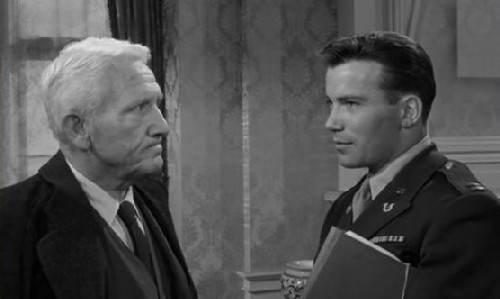
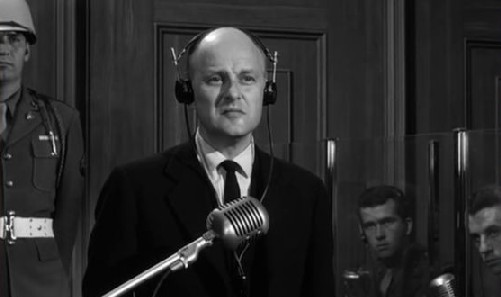
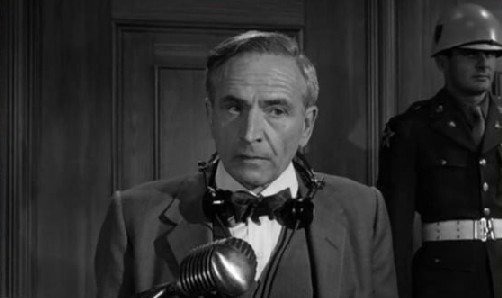
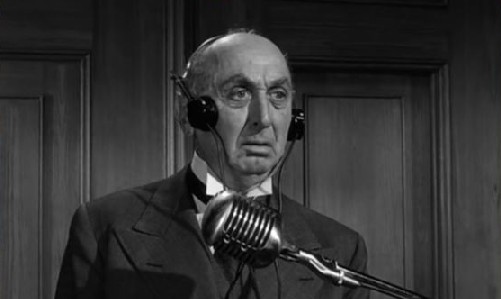
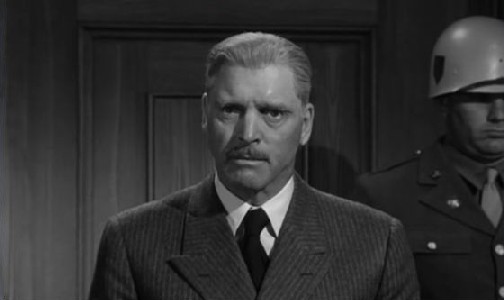
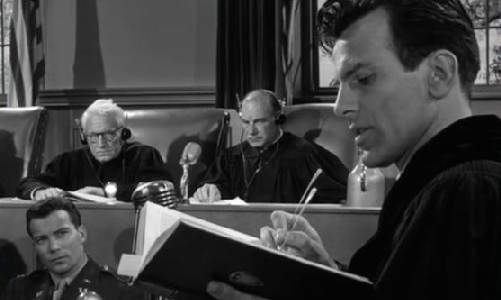
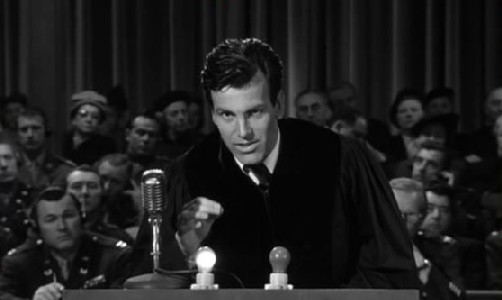
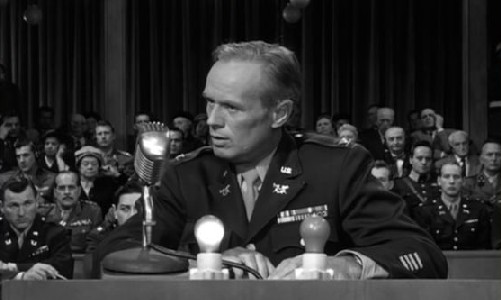
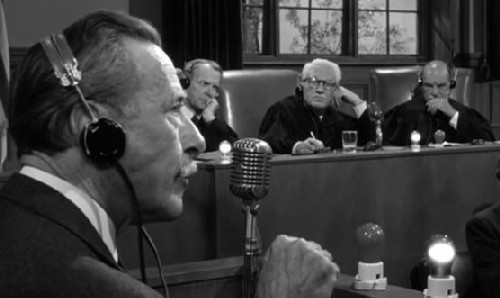
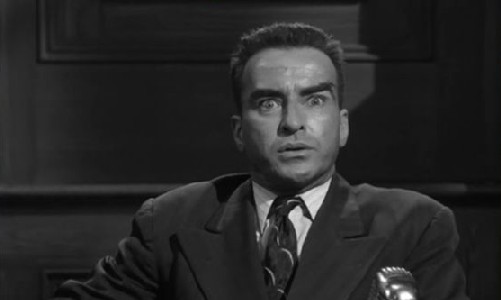
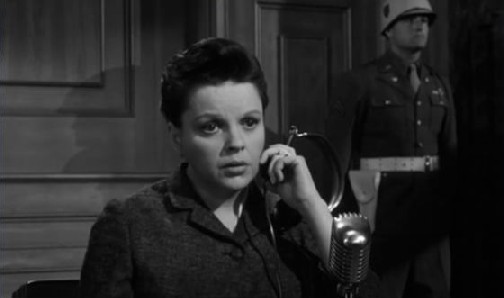
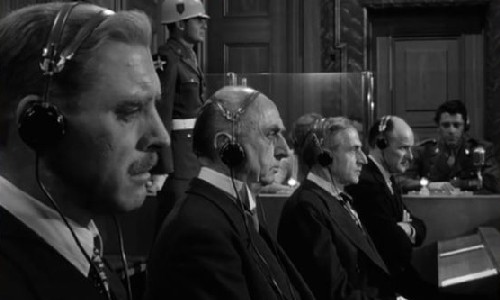
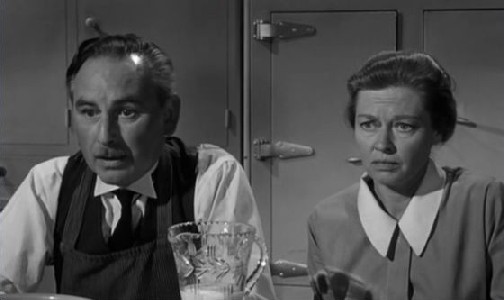
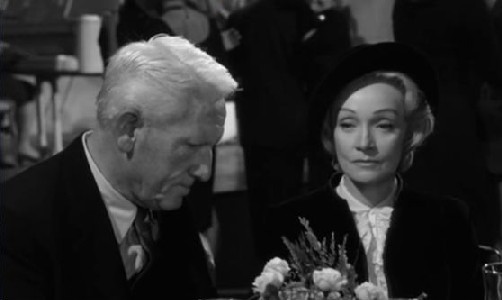
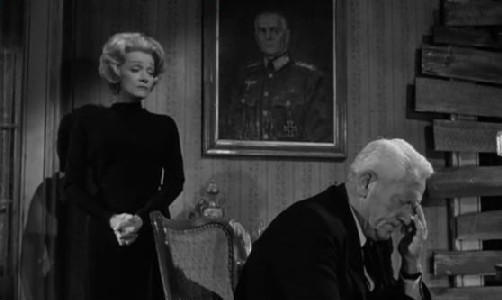
Sounds very thought-provoking. Have already added it to my must-watch list (and from the caution I know I will have to mentally prepare myself to watch this movie).
Is this adapted from a novel? I would love to read it. I have always enjoyed reading novels more than watching the movies based on them.
Thank you so much for your wishes. Wish you a very happy and a joyous new year too :-)
LikeLike
No, from what I’ve been able to gather, it seems this wasn’t based on a book. Abby Mann was supposedly very interested in the trials at Nuremberg (and the ethical issues connected to them), and so decided to write a screenplay for a TV film. The film was made (for TV), with Maximilian Schell acting the part of Hans Rolfe – which, of course, he went on to reprise in this production. Still later, this screenplay was adapted for Broadway, and Schell then played Janning on stage!
This is listed as the tenth greatest ‘courtroom drama film’ ever made. It’s definitely one of the best I’ve ever seen.
LikeLike
A very powerful film indeed!
Happy Nude Ears Madhulika, and while you are listening, wish you a fun and happy 2010! :)
LikeLike
Haha :-)). It’s very cold and foggy and clammy, so nude ears isn’t a good idea right now – they’ll freeze and fall off if I so much as try to take off the scarf wrapped round me head… but thank you, and Happy Nude Ears to you too!
LikeLike
Captain Kirk in World War II?!! Just for that alone, its worth watching! But otherwise too, this sounds like my cup of tea. I’ve caught a few stray scenes here and there and decided against watching it because movies about concentration camps are very disturbing, and also because I am sick and tired of everything in World War II being solely Hitler’s (and other Nazi’s) fault! So a movie that takes a more balanced view (especially one with so many of my favorite actors) I definitely need to see. I’ll catch it next time it plays on TCM…
LikeLike
When I see this again, I’m going to leave when the concentration camp scenes begin, and return only after 5 minutes… it was just too, too disturbing.
And yes, I find that “everything was the Nazis’ fault” bit too irritating. Some of the points Rolfe makes in his defence of Ernst Janning et al definitely make one think.
LikeLike
Happy New Year, dustedoff!
“Judgement at Nuremberg” haunted me too…the images, the questions asked, the arguments set forth all stayed in my mind for days. I came away from the film, feeling both deeply sorry for and disgusted with the human race. Sigh.
LikeLike
And happy new year to you too, Shalini! Thank you for stopping by – good to ‘see’ you again. :-)
Judgement at Nuremberg struck me as one of those films that tackle an issue in a mature and level sort of manner. Too many directors and writers tend to turn an issue into a huge melodrama which looks at the issue from only a few points of view. This one was superb in that respect – it would take up an argument, then turn it on its head, and then again turn that argument on its head…
LikeLike
Black and white hollywood isn’t really my thing, however from the little i’ve seen (two to be exact) i’m always impressed most recently i saw Whatever happened to Baby jane and as whacky as it was i enjoyed it tremendously, i guss i can call it susrenseful melodrama watch it if you can. I shall look out for this on Tv it comes on quite often
LikeLike
I’ve heard about Whatever happened to Baby Jane?, but haven’t ever seen it. Will certainly look out for it!
I end up watching quite a bit of B/W Hollywood. Like most other periods/regions, it too had many variations: different genres, different levels of excellence (sometimes out and out mediocrity!)… still, I’ve managed to see some brilliant films among those.
LikeLike
Nice! I wrote about the film here – it’s an old favourite, and it’s good to know that someone else likes it so much. Especially because Stanlay Kramer’s reputation has suffered in recent decades – he is usually seen as a director who specialised in stolid, contrived “issue” films that played like tele-dramas. But I think he did some very fine work given the constraints he worked under – the studio system, the need to cast big stars – and Judgement at Nuremberg is a very good example.
Thanks also for those stills of Tracy and Dietrich together – sends a shiver down my spine to see those two greats in the same frame, especially because they never worked together when they were younger.
LikeLike
Thank you for that link – it was a great post. I had no idea Olivier was the original choice for Janning. I have a feeling he would perhaps have handled it better than did Burt Lancaster. Still, despite that… an excellent, very powerful film.
LikeLike
I’ve always wanted to see this movie. It does appear sometimes on TV here, but very late at night (as alway with old films)!
Thanks for reviewing this and reminding me of it again.
LikeLike
I wish they wouldn’t relegate old films to late at night! (But at least that’s better than not showing them at all – which was how it was in India until TCM came along!). Do watch this sometime – it’s excellent.
LikeLike
you guys are pussies, i just watched this in school, no trauma, no nightmares. it was an excellent piece of film that showed the true colors of the era. nightmarish scenes should be expected . thats what RATINGS are for you stupid PG deemed retards.
LikeLike
Considering you just saw this ‘in school’, I’m assuming you’re a child and may not have heard of Voltaire or Evelyn Beatrice Hall, one of whom is credited with having said something along the lines of “I may not agree with what you say, but I will defend to the death your right to say it.” It means that it’s not necessary (or even polite, mature, whatever) to be foul-mouthed in order to disagree with what another person has to say. I was disturbed by the footage in the film, you weren’t. Fine. There’s absolutely no need to be so very very rude about it.
Really. What does your school teach you? Not manners, obviously.
LikeLike
what time does judy garland come in i also love this film because my great grandfather came to America from Germany because of the holocaust even though he was not Jewish he was not considered German because we Are Yugoslavian
LikeLike
I don’t remember exactly when Judy Garland comes in – as far as I recall, about halfway through the film. One of the rare films where she actually got to act, rather than merely sing and dance.
I’m glad your great-grandfather managed to get out of Germany; it must have been terrible at that time.
LikeLike